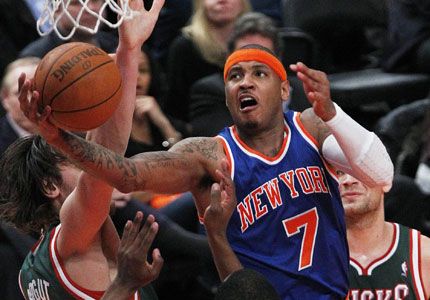Here's a shocker - I am a huge NBA, and specifically a New York Knicks fan. Once, back in the day I got asked to leave a sports bar for loud protestations of a bad out of bounds call in the first quarter of a Knicks-Pistons game.
So naturally I was glued to the TV last night to watch the first Knicks game following the blockbuster trade that had the Knicks send 4/5 of their starting team to the Denver Nuggets to acquire Carmelo Anthony and Chauncey Billups, (there were some other players involved, but essentially these were the important aspects in the transaction).
The game, which resulted in a 114-108 Knicks victory over the Milwaukee Bucks, was an uneven, at times ugly, and almost hard to watch affair. The Knicks were obviously having some difficulty adjusting to the new composition of the team, there was naturally a heightened sense of interest and excitement in the game it being Anthony's first as a Knick, and the Bucks, despite playing hard throughout, simply are not a very good team.
Anthony, the focus of intense discussion and speculation in recent weeks as the Nuggets tried to work out trades with several teams in the league, played an inconsistent kind of game. Clearly a little nervous in the first half, he missed several easy shots he'd normally make, and had some difficulty throughout the game finding a natural rhythm and flow, particularly on offense. His final stat line - 27 points on 10 for 25 shooting, 10 rebounds, and 2 steals. On paper not a great game, not horrible, but on paper certainly not a performance that in the business world we would rate as 'Exceeds Expectations'.
But the old sports cliche, 'they don't play the games on paper' is usually true, and to make a fair evaluation of Anthony's performance, you would have to actually watch the game. Late in the fourth quarter the other Knicks star player, Amare Stoudemire had fouled out, leaving Anthony the primary option on offense for the team. In these last few minutes of the game, Anthony hit two critical baskets, one a baseline drive and dunk, and the other about a 12-foot step back jumper, to cement the Knicks victory. These two possessions and baskets were the most important ones of the game, and without them it would have been entirely possible for the Bucks to pull out a win.
I know you don't care about basketball, and if you have kept reading to this point, my thanks.
Why might any of this matter at all to business, work, management? Because last night Carmelo struggled at times, shot a low percentage, looked a little tight, and for three-and-a-half quarters was wholly unremarkable.
But in the end, the part of the game known as 'Winning Time', he came though, and delivered what the team needed to for the victory. If after the game the coach of the team were to give Anthony a classic performance review in the corporate sense, there is no doubt the bad shots in the first quarter, the passing the ball out of bounds, the confusion on defense - would all probably be duly recorded and noted. Sure, the two huge buckets in the 4th quarter would make the review as well, but I bet they would appear to have equal, if not reduced, importance to the overall 'grade' as the negative plays.
The final performance rating would probably be a 'Meets Expectations' with possible recommendations to work on his shot, and study the team playbook.
And I think we do this all the time when we manage people and write performance reviews. We feel a kind of strange desire to make sure we find and highlight the negative, the odd item or two that has to be worked on, or to include the mention of some small incident, even a relatively unimportant one, as a kind of balance to the positive results achieved during the year. By creating this 'balance' we feel like we have been somehow more fair, but I bet the employees walk out of the meeting thinking only about the negative, and feeling like Carmelo would if instead of talking about the big baskets he made in the fourth quarter, we wanted to dive in to the missed layups in the first quarter.
Sure, we want to achieve top performance all the time, at every stage of the game so to speak, but is that realistic, or even possible? I wonder if a better focus is needed on what is really important and what makes the critical difference between winning and losing.
I suppose we might need a better understanding of what 'Winning Time' means at work.